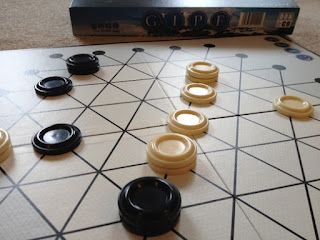Ironically, one of the last games that I got to try in the Gipf Project was actually the original - Gipf.
In Gipf, which is played on a hexagonal board, each player starts with 3 "Gipf" pieces on the board (these are the same as normal pieces, but are two pieces stacked on top of each other). The object of the game is to remove all of your opponent's Gipf pieces, or to prevent him from being able to make a valid play (by capturing too many of his pieces). The hexagonal board is divided into triangles, and the playing pieces rest on the intersection of these triangles. Each intersection along the edge of the board also has a line out from it with a dot. Players take turns placing a piece on any of the dots along the outer edge of the board and then pushing the new piece into the playing area (and pushing any pieces in front of it one space further into play - but it is not legal to push a piece off the edge of the board). Whenever one player has four of his pieces in a row, those pieces are immediately removed from the board - along with all of the other pieces that are connected to them on that row. The player who owns the four in a row gets to re-use his pieces, and his opponent's pieces are captured. The one exception to this is that it is legal (and advisable) to leave Gipf pieces on the board. Play continues like this until either one player has no more Gipf pieces on the board or until one player has run out of pieces and cannot move any more into the playing area.
 The first thing that I like about Gipf is that it is not your normal in-a-row game. There are a lot of spatial reasoning games that are all about getting a set of pieces in a row. Many of them are even very fun games that I enjoy playing. However, I like that Gipf freshens this up by using the in-a-row system to add depth to its gameplay. Gipf is not about getting pieces in a row. It is about capturing pieces. Because of this, and the fact that when you do achieve an in-a-row you get to remove the pieces, the game is more of a game of spatial reasoning tug-of-war than an "oh, I missed that and instantly lost" kind of game.
The first thing that I like about Gipf is that it is not your normal in-a-row game. There are a lot of spatial reasoning games that are all about getting a set of pieces in a row. Many of them are even very fun games that I enjoy playing. However, I like that Gipf freshens this up by using the in-a-row system to add depth to its gameplay. Gipf is not about getting pieces in a row. It is about capturing pieces. Because of this, and the fact that when you do achieve an in-a-row you get to remove the pieces, the game is more of a game of spatial reasoning tug-of-war than an "oh, I missed that and instantly lost" kind of game.The next thing that I like about Gipf is the pushing mechanic. Every place on the board has at least two directions that it can be pushed from. This means that there is not a place that is "safe". Any move that I make can be countered by my opponent, which is amazing. In addition, the fact that pieces are removed causes there to be gaps in between pieces, which adds to the strategy of the game. You may be setting up your opponent to lose his Gipf piece. However, he can push it one space and get it outside of the line that you were setting up for him. What's more, if he is able to complete your line, then suddenly you don't even have any pieces near his Gipf. Unfortunately, there are two edges of this strategy - sometimes your Gipf piece is in danger, and it is in the middle of the board with no other pieces adjacent to it. And, thus, you cannot move it in a single turn - thereby having no way to protect it.
The next thing I like about Gipf is something that I believe Go claims about itself. "Minutes to learn, a lifetime to master." (After Googling, I was wrong, and this is actually Othello). I don't know that Gipf takes a lifetime to master, but it is definitely very easy to teach and yet has quite a bit of depth to strategy. Games that are easy to teach allow you to have more opponents. More opponents mean someone that has never played might beat the snot out of you at the game simply because they take a strategy that you hadn't thought of.
 |
Overall, I give Gipf a 9.0. I think that people might get together to play it. I have also convinced myself that they probably would for Dvonn, and that I should have given it a 9.0 also. Oh well. If you enjoy spatial reasoning games, I think it is definitely worth your time to check out all three of these games from the Gipf project.
If Gipf sounds interesting, you should also check out Abalone, Ingenious, and Jin Li.

GIPF is a brilliant game which scores really well from both the strategic and the tactic view point.
ReplyDeleteJust like Chess it has a beginning, a middle and an end phase which need to be tackled in a very different way. Especially when played in Expert mode where the amount of G's can vary and you could have 4 G's in the middle of the board that will never disappear things become really fun!
If you love chess you will love GIPF.